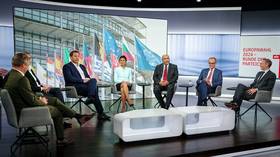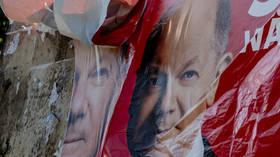German party bosses clash over ‘Nazi’ label

The co-leader of Chancellor Olaf Scholz’s Social Democratic Party of Germany (SPD) has claimed members of the rival Alternative for Germany (AfD) are “Nazis,” after the SPD suffered an upset in the European parliamentary elections.
The SPD is projected to have claimed around 14% of the vote for the EU legislature, after four days of polling ended on Sunday. That places it third behind the AfD, which is estimated to have won 16%, and the Christian Democrats, which are projected to have won 30%.
During a panel discussion on the n-tv broadcaster on Sunday evening, the SPD’s Lars Klingbeil said he expects better results in the federal parliamentary election next year. “I believe that the result of the European election will wake up many people to the fact that the Nazis have become stronger,” he stated. Consequently, voters will “fight for democracy,” Klingbeil predicted.
AfD co-chair Alice Weidel asked Klingbeil to clarify who in particular he had branded “Nazis,” to which he replied: “You know that I mean: the AfD and you.”
Klingbeil doubled down on the remark after Weidel had asked “Did you just call me and the party Nazis?” – prompting her to respond: “OK. Interesting.”
Sahra Wagenknecht, leader of the new left-wing BSW party, intervened by calling for the AfD to be dealt with “in a more differentiated manner,” but argued that some in the party’s ranks fit the “Nazi” label.
Wagenknecht cited Bjorn Hocke, the AfD leader in Thuringia, who last year was charged with the public use of a banned slogan that was first adopted by the Nazi paramilitary wing the Sturmabteilung in the 1930s.
Wagenknecht also claimed that MEP Maximilian Krah would fit the “Nazi” label, after he said in an interview last month that not all members of the Waffen-SS should be considered criminals. The remark caused a rift between the AfD and its allies in the European Parliament. Krah resigned from the party leadership team and suspended campaigning to defuse the tensions.
Traditional political forces in Germany have accused the right-wing AfD of Nazi leanings for years. In 2022, the German domestic intelligence agency, the BfV, branded the party a suspected extremist organization that needs to be monitored. Last month, the administrative court in Muenster ruled there were legal grounds for such a designation, but stressed that it did not consider the suspicion proven.
Wagenknecht’s BSW party gained around 6% of the vote in its first European Parliament election. The SPD’s allies in the “traffic light” coalition, the Free Democrats (FDP) and the Greens, suffered losses, with the latter falling to 12%, down from 20.5% in the previous ballot in 2019.













